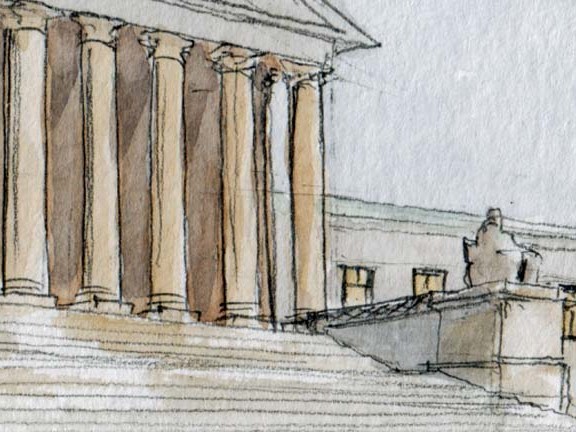The solicitor general files brief in President Trump’s challenge to New York subpoena

on Nov 25, 2019 at 12:44 pm

Of the two cases involving subpoenas for President Donald Trump’s financial records that are currently before the Supreme Court, the D.C. case—arising out of a subpoena to Mazars from the House Oversight Committee—is likely to generate larger headlines when the justices rule on Trump’s application to stay enforcement of the subpoena for the duration of his forthcoming appeal. But late on Friday, the solicitor general filed a “friend-of-the-court” brief in the other case, arising out of a subpoena to Mazars from New York County District Attorney Cyrus Vance, that is as interesting for what it does not say as for what it does. Although the government filed ostensibly in support of Trump (who is represented by private counsel), its brief objects to the subpoena on far narrower grounds—and does not endorse the theory of presidential immunity advanced by the president.
As my prior post summarized, Trump’s petition for certiorari in the New York case presents broader questions than those the New York federal appeals court decided on November 4. At its core, the petition argues that the president is absolutely immune from criminal prosecution while in office, and so he may therefore seek to quash any and all subpoenas even when issued to third parties, so long as they arise out of criminal investigations that may implicate him. Mazars waived any right to respond to the petition, whereas Vance responded on Thursday. Trump’s reply is due today—which would allow the case to be distributed in time for the justices’ December 13 conference.
Late Friday, Solicitor General Noel Francisco filed an amicus brief in support of the president that could change the tenor of the justices’ deliberations. After explaining why both Article II of the Constitution and the Supremacy Clause raise “concerns” about state-court subpoenas for the president’s personal financial records, the government’s brief stops short of arguing that the president enjoys the extensive immunity for which the president’s personal lawyers argued. Instead, it points to the Supreme Court’s 1974 decision in United States v. Nixon for the claim that “such a subpoena is permissible only where there is a ‘demonstrated, specific need’ for the information sought.” In other words, Vance’s subpoena is not invalid on its face, but, in the solicitor general’s view, it fails to meet the “applicable constitutional standard.”
This argument is revealing in at least two respects. First, and most importantly, the Supreme Court in Nixon did not trace the “demonstrated, specific need” requirement to any constitutional concerns about the subpoena; it traced it, at most, to concerns about a countervailing claim of executive privilege. As the U.S. Court of Appeals for the District of Columbia Circuit explained in its 1997 decision in In re Sealed Case, that discussion in Nixon means that “[a] party seeking to overcome a claim of presidential privilege must demonstrate: first, that each discrete group of the subpoenaed materials likely contains important evidence; and second, that this evidence is not available with due diligence elsewhere.” In the New York case, though, the president is challenging the subpoena on its face; he has not asserted any executive privilege defense.
Second, the solicitor general’s amicus brief spends several pages walking through the constitutional concerns that could arise from subjecting a sitting president to any judicial process. But the Supreme Court rejected those concerns, at least as a categorical matter, in Clinton v. Jones—in which it allowed a sitting president to be subject to civil process in a lawsuit that challenged his own conduct prior to taking office. Between them, the Supreme Court’s decisions in Nixon and Clinton appear to stand for the proposition that the president must offer some reason to believe that the particular legal process at issue would interfere with his ability to discharge the duties of his office. And on this point, the solicitor general’s amicus brief is silent; it does not identify any respect in which Vance’s subpoena, which seeks historical financial records in the hands of a third party, would in any way interfere with the president’s constitutional responsibilities.


